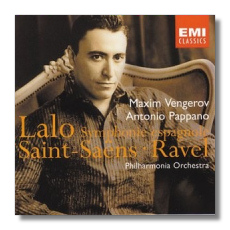
The Internet's Premier Classical Music Source
Related Links
-
Lalo Reviews
Ravel Reviews
Saint-Saëns Reviews - Latest Reviews
- More Reviews
-
By Composer
-
Collections
DVD & Blu-ray
Books
Concert Reviews
Articles/Interviews
Software
Audio
Search Amazon
Recommended Links
Site News
 CD Review
CD Review
Lalo / Saint-Saëns / Ravel

- Eduard Lalo: Symphonie espagñole, Op. 21
- Camille Saint-Saëns: Violin Concerto #3, Op. 61
- Maurice Ravel: Tzigane
Maxim Vengerov, violin
Philharmonia Orchestra/Antonio Pappano
EMI Classics 5 57593 DDD 74:04
Vengerov's personal reminiscences have been included in the booklet notes. He performed the Lalo and the Saint-Saëns when he was eight and nine years old, respectively, and calls the latter "very dear to [him]," because it was the vehicle for a competition victory. He also shares with us that the violin he plays on this CD is a 1727 Stradivarius that once belonged to Rodolphe Kreutzer. So much for name dropping!
From first note to last, this CD demonstrates uncommon brilliance and temperament in musicianship. Vengerov, never a dull or an undemonstrative player, really outdoes himself here, and Pappano is equally fiery. Some listeners think Lalo's Symphonie espagñole is dull stuff – a watercolor portrait of Spain, at best – but their minds may well be changed by this crackling, oily, and even hot-blooded performance. The opening orchestral tutti sets the stage with thumping, dramatic accents, and Vengerov responds to the orchestra's challenge with the equivalent of an arrogant sneer. And so it goes. There isn't a lot of warmth here, even in the fourth movement, but Vengerov's uncommon swagger makes the score sound fresher than it has in years.
The most popular of Saint-Saëns's three violin concertos receives a similarly bold performance. Vengerov charmingly refers to the second movement as "like a dream world of a musician – total mediation, especially near the end, where the music melts little by little, taking us to other planets, stars, spheres…"
Ravel's Tzigane is a wildly difficult showpiece, at once both a parody and an affectionate tribute to the clichés of gypsy violin-playing. Vengerov, in the unaccompanied opening, plays with haughty disdain for the music's technical challenges. As the tempo picks up, he becomes more and more unbridled, and by the music's end, one fears for the safety of the violin – will it be torn apart? Here (as in the finale of the Saint-Saëns), one wonders if the music's figurations might be more intelligible if they were played a little less wildly, but no one can sincerely complain that Vengerov and Pappano haven't put on a good show.
The engineering is idealized. There's more of the studio here than the concert hall. Still, the effect is brilliant – just like the musicianship itself. If you like any or all of these three works, you need to hear Vengerov's excitingly rude take on them.
Copyright © 2003, Raymond Tuttle


















